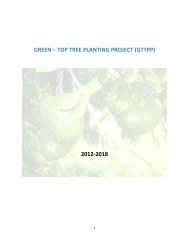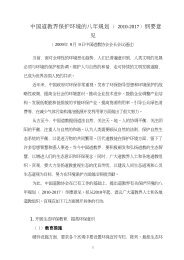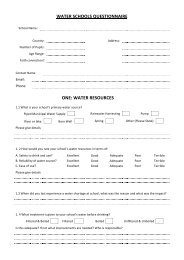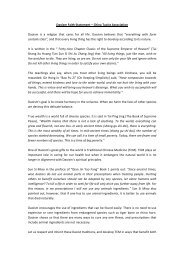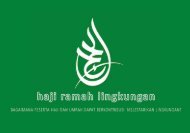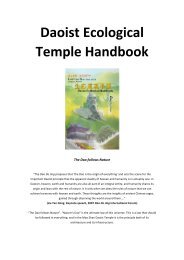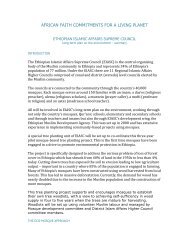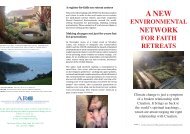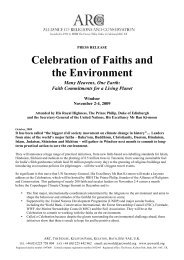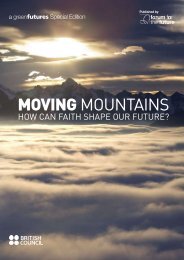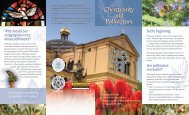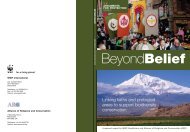summary paper - Alliance of Religions and Conservation
summary paper - Alliance of Religions and Conservation
summary paper - Alliance of Religions and Conservation
You also want an ePaper? Increase the reach of your titles
YUMPU automatically turns print PDFs into web optimized ePapers that Google loves.
It is not enough to base partnership on a mutual recognition <strong>of</strong> the equal worth <strong>of</strong> the different resources<br />
brought into partnership, as stated in the Christian criteria (presented to us by ARC), as long as it fails to<br />
address the one major potential conflict related to human rights based equality between men <strong>and</strong> women.<br />
Without taking up this issue, partnership with religious communities <strong>and</strong> faith group would in most cases<br />
mean a strengthening <strong>of</strong> male dominance <strong>and</strong> patriarchal structures. Too <strong>of</strong>ten the rights <strong>of</strong> women are<br />
sacrificed because some think there are higher goals to fight for. Such a goal might be concealed under<br />
the label sustainable development. The counter question then would: Could there be sustainable<br />
development without acknowledging the equal human rights <strong>of</strong> men <strong>and</strong> women It is necessary to keep<br />
two thoughts in mind at the same time, when discussing partnership with religious communities: Certainly<br />
faith groups could have a role to play as advocates for changed policy on nature, conservation <strong>and</strong><br />
development. But as long as the world religions are predominately patriarchal, it is also important to lift up<br />
a gender critical perspective in order not only to strengthen the male power but also to build an<br />
awareness <strong>of</strong> women being equal to men.<br />
In the conference <strong>paper</strong> there is much talk about religious communities being a resource for<br />
development, even haven “a specific focus on the weak <strong>and</strong> vulnerable”. Much empiri would show that it<br />
is not the male dominated religious leadership that has this focus, but the women. So when speaking<br />
about criteria: The issue <strong>of</strong> religion, power <strong>and</strong> gender must be addressed together with a discussion on<br />
human rights <strong>and</strong> a rights based approach. Otherwise the potential <strong>of</strong> partnership between development<br />
agencies, governments <strong>and</strong> religious groups might be a potential <strong>of</strong> oppression instead <strong>of</strong> sustainable<br />
development <strong>and</strong> a potential <strong>of</strong> increased male dominance within a patriarchal structure. There is also a<br />
need to be aware <strong>of</strong> the limitations <strong>of</strong> faith groups within development. Partnership with religious groups<br />
on everything, everywhere should not be the goal, rather one should enter into a dialogue before entering<br />
into partnership in order to rule out what such a partnership could result in <strong>and</strong> whether the result would<br />
be good not only for the existing structure but also for change.<br />
References:<br />
Maria Eriksson Baaz (2005): The Paternalism <strong>of</strong> Partnershi. A Postcolonial Reading <strong>of</strong> Identity in<br />
Development Aid, London <strong>and</strong> New York, Zed Books<br />
Emma Crewe <strong>and</strong> Elizabeth Harrison (1998): Whose Development An Etnography <strong>of</strong> Aid, London <strong>and</strong><br />
New York, Zed Books<br />
Alan Fowler (2002): “Beyond Partnership: Getting Real about NGO Relationships in the Aid System” in<br />
Michael Edwards <strong>and</strong> Alan Fowler (eds.): The Earthscan Reader on NGO Management, pp.<br />
241255, London <strong>and</strong> Serling, Earthscan Publications ltd.<br />
Participated in the roundtable without presenting <strong>paper</strong>s:<br />
Reverend Japhet Ndhlovu, Council <strong>of</strong> Churches in Zambia<br />
Arild Øyen, The Norwegian Ambassador to Angola<br />
SUMMARY OF WORKING GROUPS<br />
On the last day <strong>of</strong> the conference, participants were divided into four groups. Each group had one hour to<br />
discuss one <strong>of</strong> the questions below (proposed by Olav Kjørven) <strong>and</strong> then present a <strong>summary</strong> <strong>of</strong> the talks<br />
in the plenary session that followed.<br />
The questions to breakout groups:<br />
1. What would be the most useful <strong>and</strong> productive next steps from this conference For example, would it<br />
be worthwhile producing a set <strong>of</strong> shared principles that would guide future collaboration between<br />
development agencies <strong>and</strong> faithbased entities How should this best be done<br />
53



